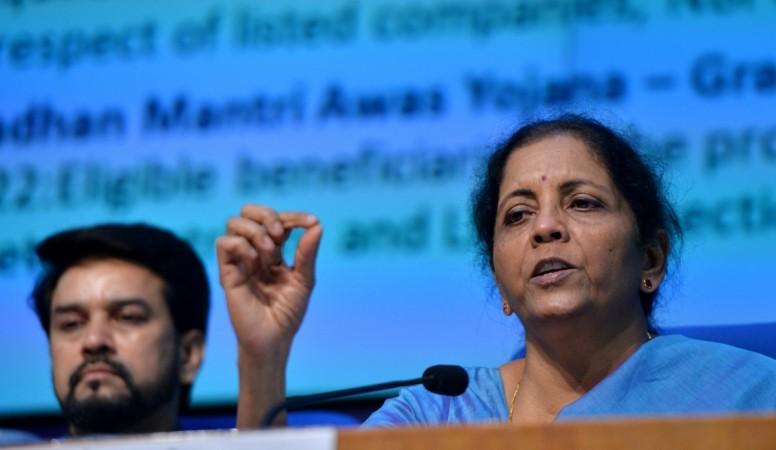![The building of Ministry of Finance is seen in the background [Representational Image]. Ministry of Finance building in New Delhi](https://data1.ibtimes.co.in/en/full/607415/ministry-finance-building-new-delhi.jpg?h=450&l=50&t=40)
Goods and Services Tax (GST) collection in September tanked more than 2.5 per cent to Rs 91,916 crore year on year basis highlighting continued slowdown in the Indian economy. More importantly, the development raises serious questions on the government's claim of taking appropriate actions to spur growth as September's GST collection is lowest since February 2018. Last month's GST collection stood at Rs 98,202 crore.
India is witnessing an economic slowdown for a long time now, however, finance minister Nirmala Sitharaman has remained in denial mode. The country reported 5 per cent growth rate in its GDP in the quarter ending on June 2019, which was lowest in 25 quarters. In fact, the data in June showed a fifth successive quarter of tepid growth in the Indian economy.
As per a report in Hindustan Times, experts have attributed the fall in GST collections to the economic slowdown. Deloitte India partner MS Mani said, "The lower collections seem to be on account of the lower GDP [gross domestic product] growth numbers that we have seen as GST is a transaction tax that is immediately impacted by any decline in economic activity."

The fall in GST collections in September has been coupled with a significant slowdown in various high-frequency economic indicators. For the month of September, the Nikkei India Purchasing Managers' Index was reported at 51.4. Although it is above 50 which separates growth from contraction, the difference is merely 1.5 per cent above the cut off level. The auto that is one of the worst affected segment of the economy is also struggling to bounce back.
Even September's numbers are not encouraging as the country's largest carmaker Maruti Suzuki reported a 27 per cent annual decline in domestic car sales. Moreover, as per the data compiled by the Centre for Monitoring Indian Economy (CMIE) until the month of August 2019, the domestic car sales have not plummeted for 14 consecutive months.
Moreover, the numbers from eight core sectors (coal, crude oil, natural gas, refinery, fertilizer, steel, cement, and electricity) also tell the same story. As per data released on Monday, the core industry shrank by 0.5 per cent in August 2019 that is the lowest since August 2015. Pratik Jain, national leader, indirect tax, PwC India the government will have to put in extra efforts to arrest slowdown. He said, "The lower collections perhaps do reflect the economic reality on the ground and the government will need to find ways to spur the demand."

















